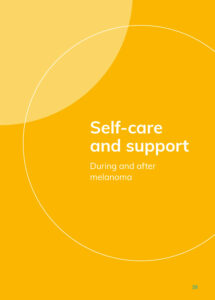Melanoma diagnosis and treatment can be challenging for patients, and their friends and families. People may find it difficult to cope and may want to see a psychologist for additional support.
People diagnosed with melanoma and their loved ones may choose to seek mental health support for a variety of reasons at any time during diagnosis and treatment.
Some of the topics a psychologist can help you with include:
• coping with common painful emotions such as fear, anxiety, anger, and sadness
• coping with fatigue, a common side-effect of melanoma treatment
• implementing practical strategies to address poor sleep or manage pain
• helping you identify the important priorities in your life and brainstorming ways to live a life closer to what you value
• providing practical strategies to cope with anxiety around follow-up consultations and any fear that melanoma may come back or get worse
• supporting you through grief and loss
• supporting you with body image issues and sexuality
• supporting you through role and life stage changes
• assisting with any relationship problems that may be a result of, or worsened from, your melanoma diagnosis
• assisting you with re-entering the workforce
• assisting with any decision-making you are experiencing difficulty with. Although a psychologist will not tell you what the right decision is – they can help you weigh up the options and highlight any information that may make the decision clearer for you.
For a lot of people, consulting a psychologist is something new, which may feel daunting. It is important to remember that sessions with a psychologist portrayed in popular media are not always accurate!
To guide you through the process of seeing a psychologist, here’s what to expect from your first session:
In the waiting room – before seeing a psychologist
While waiting to see a psychologist, you may be given a questionnaire and/or consent form to complete.
QUESTIONNAIRE:
The purpose of the questionnaire is for the psychologist to get a sense of how you are feeling before any treatment starts. This will allow them to compare your responses before and after therapy to see whether therapy made a difference. There are no right or wrong answers to the questions, and it is important that you answer the questions honestly.
CONSENT FORM:
Most consent forms will contain some information about the service, including fees and the procedure for cancellations. It will also contain information about confidentiality and its limits. It is important that you read the consent form and note any questions that you may have – they can be discussed during your first session.
Your first session
Psychology sessions are usually 50 minutes in duration – if your psychologist has a different preference, they will let you know.
The purpose of the first session is for the psychologist to build trust, get to know you and understand the reasons that have prompted you to seek help. The psychologist will likely start the session with going over information about the service they provide, confidentiality and letting you know what to expect. Then they may ask you questions about your difficulties, your melanoma and your life in general. Alternatively, they may leave it to you to lead the conversation about what is most important to you to talk about.
Being prepared helps you get the most out of your session
To make the most out of your first session with the psychologist, prepare by thinking about why you are seeking help. Answering the following questions may be helpful:
– What do I want from my appointment?
– What are the biggest challenges I am facing right now?
– What is my ‘end goal’ from these sessions?
The first session may end with the psychologist sharing their understanding of your situation and highlighting how they can help. They may ask you to do something between sessions – for example, complete a worksheet or an activity. If something does not sound right, this provides a great opportunity to clear things up or ask further questions.
By the end of the first session, you will notice that your trust will start to build with the psychologist; however, if this is not the case, it is important to raise this with your psychologist. It is important to be honest about how you are feeling, and the psychologist will welcome your feedback.
Tips for getting the most out of your therapy
– Choose the right psychologist. For help with issues following melanoma diagnosis and treatment, it helps to see a psychologist who specialises in supporting people with cancer. Speak to your GP/oncologist about appropriate referrals. Cancer Council has a database of psychologists that specialise in oncology, they can be called on 13 11 20.
– Keep regular appointments. You will discuss the frequency of your appointments with the psychologist. If you are learning new skills to cope, the sessions may be more frequent (e.g. weekly, fortnightly) to provide you with enough guidance to learn these skills. Once the skills are learned the sessions may be less frequent to allow you to implement skills more independently.
– Be honest. It is sometimes hard to talk about your problems to others. It is important to keep honest about how you are feeling – that is the only way the psychologist will fully understand you and be in the best position to provide support. It is also important to be honest if you are feeling that your relationship with the psychologist is not right, if you have any apprehension about the treatment plan or your progress.
– The psychologist is on your team. Therapy works best when it is collaborative. As much as the psychologist knows about theory and skills that may be helpful, you are the expert of you – you know what will work for you and how you can best implement strategies in your life.
– Do the work between sessions. It is unlikely that your challenges will resolve by talking about them 50 minutes per week. Implementing strategies discussed in session outside therapy is the best way to make sustainable changes and learn different ways of responding that may help you with future challenges.
– Prepare for your sessions. Before each session it is helpful to reflect on:
– how did I go with the practice tasks (if agreed on)? What helped me complete them? What got in the way?
– how am I tracking with the goals? Am seeing progress? Why or why not?
– what is important for me to discuss in the session? How do I want the psychologist to help me with these issues?
For many people seeing a psychologist and starting therapy is a big step, and is often met with apprehension and anxiety as it is unfamiliar. However, people often comment that starting therapy was not as scary as they’d imagined and that they are glad that they took this important step in looking after themselves.
What is the difference between a psychologist, a counsellor and a psychiatrist?
Psychologists (or Clinical Psychologists) use evidence-based strategies to help you manage emotional conditions, usually in the long term. A registered psychologist must complete four years of psychology at undergraduate level, followed by either postgraduate studies in clinical or health psychology or two years of supervised clinical practice.
Counsellors can listen to what is going on in your life and offer strategies for dealing with issues you are facing. They do not need to have any qualifications to practise, although many do, so it’s a good idea to check before making an appointment.
A psychiatrist is a trained medical doctor who specialises in the diagnosis, treatment and prevention of mental illness. As well as providing psychological support and discussing issues with patients, a psychiatrist may prescribe medicines to help manage a range of emotional conditions. You need a referral from your GP to see a psychiatrist.
Information from Cancer Council NSW.
Additional support resources
Download our Melanoma Institute Australia ‘Self-care and support’ guide
Download the ‘Emotions and Cancer’ guide from the Cancer Council website.







This article was excellent and useful
thank you
Thank you, we are very happy to hear that!